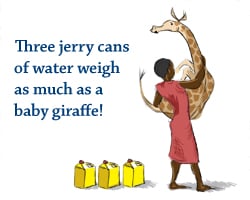Facts do not cease to exist because they are ignored. – Aldous Huxley
It’s 6: 33 PM on day 358 of my journey towards independence and I’ve managed to brush my teeth, tweet about my Clean Water For All Campaign – no luck – feed myself chicken nuggets and an avocado sandwich for breakfast, look for a literary agent to publish my book – if you have no idea what I’m talking about refer to Day 348 – tweet about my campaign some more–still no luck– feed myself rice and curry for lunch, watch TV, feed myself plain yoghurt and oranges for dinner and brush my teeth once more.
About two days ago I decided to do some research on the water crisis that is killing millions of people all over the world because I knew that I couldn’t inform you of what was going on if I myself didn’t know and I went one step further by posting the facts I had read on Facebook and Twitter suddenly random strangers were making donations and spreading the word about what I was trying to do which leads me to the conclusion that the best way to get people to listen is not by making impassioned pleas but rather by informing them of what is happening so today I am going to share with what I discovered during my research in the hopes that when you finish reading this you will log on to my fundraising page and make a donation – if you haven’t already – or at the very least help me by spreading the word. Take a look:
Why I spend hours upon hours trying to raise money to build a well somewhere in the world
Water
- 884 million people lack access to safe water supplies; approximately one in eight people. (5)

- 3.575 million people die each year from water-related disease. (11)
- The water and sanitation crisis claims more lives through disease than any war claims through guns. (1)
- People living in the slums often pay 5-10 times more per liter of water than wealthy people living in the same city. (1)
- An American taking a five-minute shower uses more water than a typical person in a developing country slum uses in a whole day. (1)
Children
- Diarrhea remains in the second leading cause of death among children under five globally. Nearly one in five child deaths – about 1.5 million each year – is due to diarrhea. It kills more young children than AIDS, malaria and measles combined. (13)
- Every 20 seconds, a child dies from a water-related disease. (2)
- Diarrhea is more prevalent in the developing world due, in large part, to the lack of safe drinking water, sanitation and hygiene, as well as poorer overall health and nutritional status. (13)

- Children in poor environments often carry 1,000 parasitic worms in their bodies at any time. (8)
- In the developing world, 24,000 children under the age of five die every day from preventable causes like diarrhea contracted from unclean water. (13)
- 1.4 million children die as a result of diarrhea each year. (11)
Women
- In just one day, more than 200 million hours of women’s time is consumed for the most basic of human needs — collecting water for domestic use.
- This lost productivity is greater than the combined number of hours worked in a week by employees at Wal*Mart, United Parcel Service, McDonald’s, IBM, Target, and Kroger, according to Gary White, co-founder of Water.org.

- Millions of women and children spend several hours a day collecting water from distant, often polluted sources. (1)
- A study by the International Water and Sanitation Centre (IRC) of community water and sanitation projects in 88 communities found that projects designed and run with the full participation of women are more sustainable and effective than those that do not. This supports an earlier World Bank study that found that women’s participation was strongly associated with water and sanitation project effectiveness. (7)
Disease
- At any given time, half of the world’s hospital beds are occupied by patients suffering from diseases associated with lack of access to safe drinking water, inadequate sanitation and poor hygiene. (1)
- The majority of the illness in the world is caused by fecal matter.9
- Almost one-tenth of the global disease burden could be prevented by improving water supply, sanitation, hygiene and management of water resources. Such improvements reduce child mortality and improve health and nutritional status in a sustainable way. (14)

- 88% of cases of diarrhea worldwide are attributable to unsafe water, inadequate sanitation or insufficient hygiene. (9)
- 90% of all deaths caused by diarrheal diseases are children under 5 years of age, mostly in developing countries. (8)
- It is estimated that improved sanitation facilities could reduce diarrhea-related deaths in young children by more than one-third. If hygiene promotion is added, such as teaching proper hand washing, deaths could be reduced by two thirds. It would also help accelerate economic and social development in countries where sanitation is a major cause of lost work and school days because of illness. (6)
(Note: The facts and images above are coutesy of water.org)
Are we connecting on Twitter? If not, say hi at http://twitter.com/Nisha360
If you’ve given to my cause or you can’t give now, please help me by sharing my cause with others. You can tweet about it like my friend Stan Faryna. This is the tweet he uses: @Nisha360 is a brave, smart young woman trying to make a better world for us all. Please help her do an amazing thing. http://bit.ly/hC7vOu
Stan’s very sweet for saying so, but feel free to write what reflects you best.
Thanks to all my friends out there who are helping me make my dream come true: to make a better world for all of us!